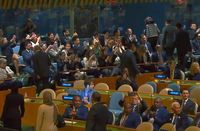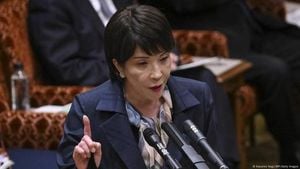On September 26, 2025, the United Nations General Assembly witnessed a dramatic and highly charged moment as Israeli Prime Minister Benjamin Netanyahu took the stage to deliver his address. The grand hall, which can seat up to 1,800 delegates, was conspicuously empty for much of Netanyahu’s speech. According to multiple news outlets including The Guardian, Axios, and The Times of Israel, several hundred diplomats staged a coordinated walkout as Netanyahu entered the hall, leaving only a handful of representatives—mainly junior diplomats from the United States and United Kingdom—scattered among the rows.
The walkout was no small gesture. Representatives from Arab, Muslim, and African countries were joined by several European states in their protest, making it clear that Netanyahu’s presence and Israel’s ongoing military campaign in Gaza have left the country deeply isolated on the world stage. Even the applause from Netanyahu’s supporters, who stood and clapped loudly in an attempt to draw attention away from the exodus, could not mask the visual impact of the empty seats. Among those standing with Netanyahu’s entourage in the side gallery was New York City Mayor Eric Adams, a sign of local political support amid international rebuke, as reported by The Times of Israel.
The timing of Netanyahu’s speech could hardly have been more fraught. Just days earlier, ten countries—including France, the United Kingdom, Canada, and Australia—formally recognized an independent Palestinian state, breaking with the traditional U.S. stance. As The Guardian noted, this brings the total number of UN member states recognizing Palestine to 157 out of 193. The move underscored a growing global impatience with the status quo and a desire for a two-state solution, despite fierce opposition from the Israeli government.
Netanyahu’s address did not shy away from these developments. In fact, he confronted them head-on, calling the recognition of a Palestinian state “insane” and a two-state solution “sheer madness.” He drew a provocative comparison, saying, “Giving the Palestinians a state one mile from Jerusalem after October 7 is like giving al-Qaeda a state one mile from New York City after September 11.” The Prime Minister insisted, “It’s insane, and we won’t do it.” He further chastised the countries that recognized Palestine, declaring, “You didn’t do something right. You did something wrong, horribly wrong. Your disgraceful decision will encourage terrorism against Jews and against innocent people everywhere.”
Netanyahu’s rhetoric was matched by actions intended to amplify his message beyond the walls of the UN. According to Axios and The Guardian, he ordered the Israeli military to position loudspeakers around the Gaza Strip to broadcast his speech directly to Palestinians. Israeli intelligence reportedly attempted to take over phones across Gaza to livestream his remarks, though Associated Press reporters inside Gaza said they saw no evidence of the speech being broadcast on local phones. Netanyahu also employed visual props, including a QR code linking to footage of the October 7 Hamas attacks, in a bid to drive home the gravity of the threat he says Israel faces.
Central to Netanyahu’s message was a vow to “finish the job” in Gaza. He framed the ongoing offensive as a necessary response to the violent Hamas raids on Israel that occurred on October 7, 2023. “The final remnants of Hamas are holed up in Gaza City,” he said. “We must finish the job to avoid facing attacks like those on 7 October again and again and again. That is why we want to do so as fast as possible.” He issued a direct ultimatum to Hamas leaders: “Lay down your arms. Let my people go. Free the hostages. All of them. The whole 48. Free the hostages now. If you do, you will live. If you don’t, Israel will hunt you down.”
Netanyahu also used the platform to deny allegations of genocide in Gaza, which have been the subject of international condemnation and war crime charges by the International Criminal Court (ICC). He argued, “Would a country committing genocide plead with the civilian population it is supposedly targeting to get out of harm’s way?” Despite his defense, the humanitarian crisis in Gaza remains dire. On the day of the speech, more than 22 people were reported killed, with AFP citing local civil defense agencies and Al Jazeera reporting up to 47 deaths since dawn, including eight in a strike on a tent camp for displaced people in Nuseirat.
The walkout and Netanyahu’s speech come at a time when the international community is sharply divided over how to resolve the Israeli-Palestinian conflict. While Netanyahu doubled down on his rejection of a two-state solution, other world leaders are moving in the opposite direction. Notably, New Zealand’s foreign minister, Winston Peters, stated in New York that his country would not recognize the state of Palestine at this time but remained committed to a two-state solution. He cautioned that focusing on recognition now “could complicate efforts to secure a ceasefire by pushing Israel and Hamas into even more intransigent positions.”
Adding to the complexity, former U.S. President Donald Trump weighed in the night before Netanyahu’s speech, saying he would restrain Netanyahu from annexing territories in the West Bank in retaliation for the new wave of support for Palestinian statehood. “I will not allow Israel to annex the West Bank ... It’s not going to happen,” Trump said, according to The Guardian. This statement caused concern among UK officials, who feared that U.S. policy could shift in ways that might further destabilize the region. Rightwing allies of Netanyahu have previously proposed annexing up to 82% of the West Bank, a move that would all but eliminate the prospect of a contiguous Palestinian state.
Outside the UN, the mood was equally tense. Thousands of protesters converged on the streets of New York City, with a major rally at Times Square. Demonstrators voiced their opposition to Netanyahu’s policies and the ongoing war in Gaza, reflecting a groundswell of public discontent that has spilled beyond diplomatic circles and into the heart of one of the world’s most diverse cities.
In a telling moment, Netanyahu claimed that some foreign leaders privately support Israel’s intelligence services, even as they publicly condemn the country’s actions. “They tell me how much they value Israel’s superb intelligence services that have prevented, time and again, terrorist attacks in their capitals,” he said, though he did not specify which leaders he was referring to.
The events at the UN General Assembly this week have laid bare the deep divisions and shifting alliances that now define the Israeli-Palestinian conflict on the world stage. With 157 countries now recognizing Palestine and Israel facing mounting isolation, the path forward appears more uncertain—and more contentious—than ever.





